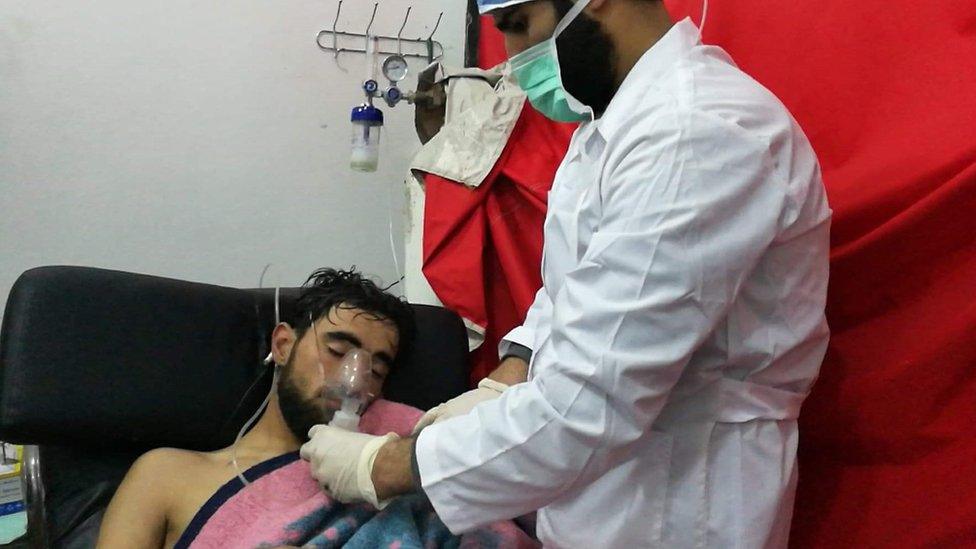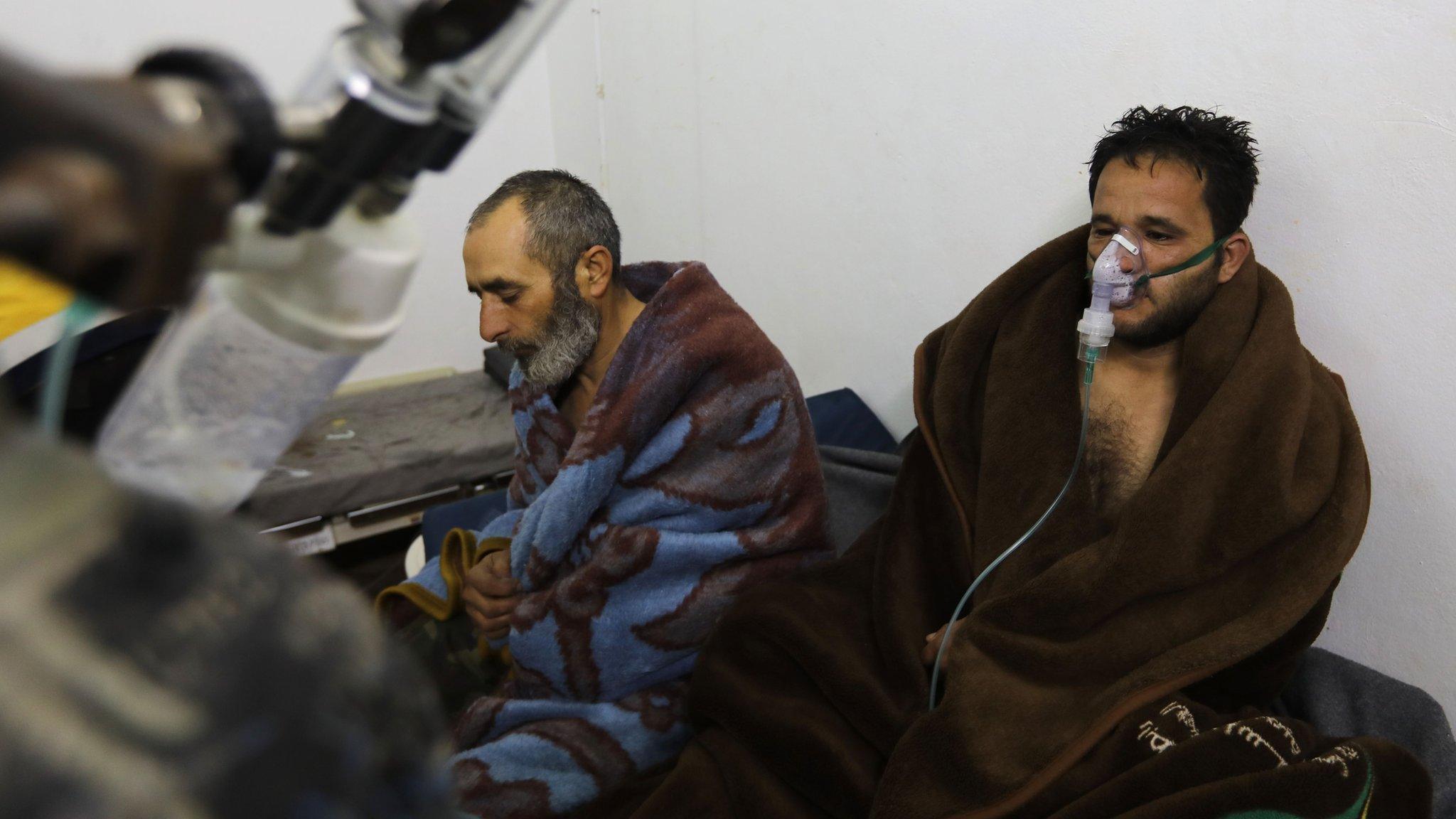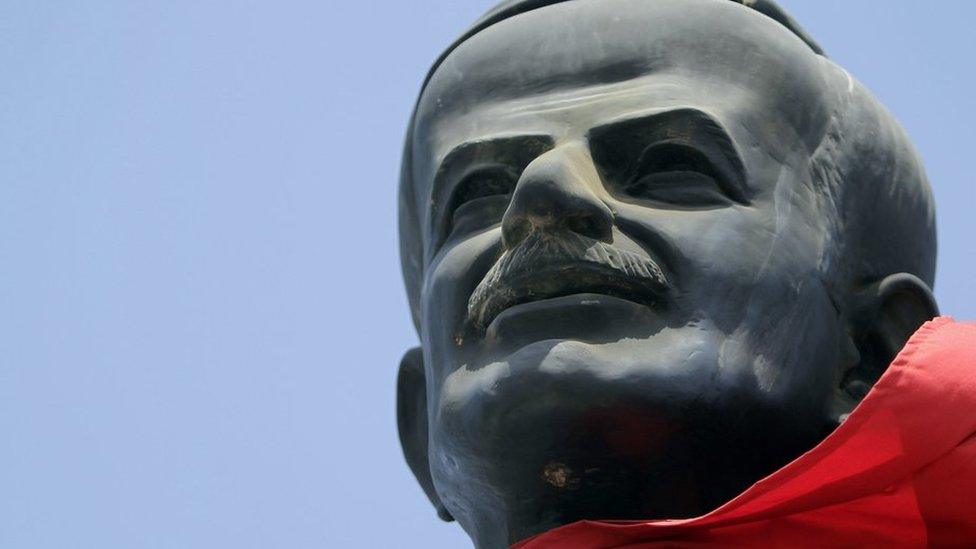Syrian air force behind 2018 chlorine attack on Saraqeb, OPCW finds
- Published

The Syrian government denies that its forces have ever used chemical weapons
A Syrian air force helicopter dropped a chlorine bomb on an opposition-held town on 4 February 2018, the chemical weapons watchdog has concluded.
An investigative team from the Organisation for the Prohibition of Chemical Weapons (OPCW) said there were "reasonable grounds to believe" at least one cylinder hit Saraqeb.
It released a toxic gas cloud that affected 12 individuals, they found.
There was no immediate response from the Syrian government or military.
However, they have previously denied allegations that government forces used chlorine or the nerve agent Sarin during Syria's decade-long civil war.
The conflict has left at least 380,000 people dead and caused half the population to flee their homes, including almost six million refugees abroad.
The OPCW said members of its Investigation and Identification Team (IIT) interviewed witnesses to the incident in Saraqeb, external, analysed samples and remnants collected at the scene, reviewed the symptoms of casualties and medical staff, examined imagery and consulted experts.
Their report concludes that on the night of 4 February 2018, during ongoing attacks against Saraqeb, a Syrian Arab Air Force military helicopter under the control of the elite Tiger Forces unit hit the eastern part of the town by dropping at least one cylinder.
"The cylinder ruptured and released a toxic gas, chlorine, which dispersed over a large area, affecting 12 named individuals," it adds.
Allow X content?
This article contains content provided by X. We ask for your permission before anything is loaded, as they may be using cookies and other technologies. You may want to read X’s cookie policy, external and privacy policy, external before accepting. To view this content choose ‘accept and continue’.

The victims, rescuers and medical personnel said they suffered symptoms including shortness of breath, skin irritation, chest pain and coughing. Toxicologists concluded that they were consistent with exposure to a toxic gas like chlorine, according to the report.
The Syrian army told the OPCW that rescue workers and jihadist fighters brought chlorine-filled cylinders to Saraqeb and staged the incident, according to the report. However, the IIT said the allegation was not supported by any concrete evidence.
Last year, the IIT released a report saying there were reasonable grounds to believe Syrian air force jets and a helicopter dropped two bombs containing Sarin and a cylinder filled with chlorine on the rebel-held village of Latamina in three attacks between 24 and 30 March 2017.
The IIT is tasked with identifying the perpetrators of chemical weapons attacks in Syria, as determined by a separate OPCW Fact-Finding Mission.
The watchdog's member states established the IIT after Russia - whose forces are backing the Syrian military - vetoed a United Nations Security Council resolution to extend the mandate of a joint UN-OPCW mission.
Syria chemical attacks: How one man lost his family in Khan Sheikhoun in April 2017
The joint mission accused government forces of using Sarin in an attack on the opposition-controlled town of Khan Sheikhoun on 4 April 2017, which reportedly killed more than 80 people. It also concluded that government forces had used chlorine as a weapon on other occasions.
The IIT has been asked to investigate an incident in the then besieged opposition-held town of Douma on 7 April 2018 that medics said killed more than 40 people.
The OPCW Fact-Finding Mission said data gave "reasonable grounds that the use of a toxic chemical as a weapon took place" in Douma, and that the "chemical contained reactive chlorine".
- Published5 February 2018

- Published7 January

- Published14 January 2019
